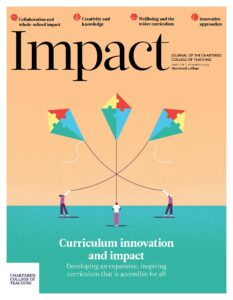Victoria Cook, Education and Research Project Specialist, Chartered College of Teaching, UK
Dominic Wyse, Professor of Early Childhood and Primary Education, UCL Institute of Education, UK
Questions concerning curriculum design and implementation have been high on the educational research and policy agenda internationally over the past decade (Manyukhina and Wyse, 2019). Curriculum design must take into account changing global, social and legislative perspectives to be relevant. In England, the revised education inspection framework (EIF) (OfstedThe Office for Standards in Education, Children’s Services and Skills – a non-ministerial department responsible for inspecting and regulating services that care for children and young people, and services providing education and skills, 2019) has seen an increased focus on curriculum in recent years. Although curriculum may be broadly defined as the planned human activity intended to achieve learning in formal educational settings (Wyse et al., 2016), in reality there are many different definitions of curriculum. For example, curriculum can be ‘What is intended to be taught and learned overall (the planned curriculum); what is taught (the curriculum as enacted); what is learned (the curriculum as experienced)’ (Alexander et al., 2010, p. 250). However, there is also a difference between the taught curriculum and what pupils actually learn. This is called the hidden curriculum and represents the implicit or unspoken messages that are conveyed to pupils at school (Gordon, 1957). In addition, the null curriculum refers to what is not taught to pupils, either intentionally or unintentionally (Eisner, 1994).
Educational curricula have also been classified in different ways, although these definitions are not mutually exclusive. Distinctions have been drawn between content-driven, objectives-driven and process-driven curricula (Ross, 2000) and between curricula designed around subjects, disciplines or broad fields, curricula designed around students and curricula designed around social problems (Doll, 1996). A more recent content analysis identified the status of knowledge in the national curriculum documents of England, Australia, Hong-Kong and Canada, and identified three types of curricula: knowledge-based, skills-orientated and learner-centred (Manyukhina and Wyse, 2019):
- Knowledge-based: The dominant organising emphasis is on knowledge
- Skills-oriented: Skills, particularly in relation to applying knowledge, are an important consideration; knowledge remains an important element
- Learner-centred: The dominant organising emphasis is on the learner, including lifelong learning and whole-person development; a bias towards an emphasis on knowledge is undesirable.
Public debates over the aims and content of the curriculum have tended to become polarised between traditionalist and progressivist curricula (Oates, 2018), with knowledge-based curricula viewed as traditional, and skills-orientated and learner-centred curricula viewed as progressive (Manyukhina and Wyse, 2019). While educationalists have long debated the relative merits of the traditional and progressive approaches, a recent analysis of the links between pupil outcomes and their teachers’ orientation found little support for the arguments made by either side, suggesting that both approaches are likely to have merit in what are complex learning processes (Sims and Jerrim, 2022).
Amid this complexity, how can we ensure that all pupils have access to an inspiring, expansive curriculum that improves their learning? And how can we ensure that teachers and school leaders have the confidence to make decisions about the curriculum based on the most up-to-date research? Rethinking Curriculum is a four-year project that is a collaboration between the Chartered College of Teaching and the Helen Hamlyn Centre for Pedagogy (0–11 years), funded by the Helen Hamlyn Trust, and which aims to do just this.
As part of this work, an exploratory survey was carried out with teachers, subject leaders and school leaders working across a range of primary school settings. A minority of respondents also worked as consultants across a range of primary school settings. The survey, which was opened on 24 November 2022 and closed on 23 January 2023, was conducted via SurveyMonkey and distributed via social media and newsletters. The remainder of this article explores the answer to the open question ‘Please describe your ideal curriculum in no more than 100 words’ (n=150). Owing to the broad focus on primary curriculum, responses that focused on subject-specific curricula and those that were unclear were discarded (n=18). The remaining 132 responses were categorised according to the three curriculum types proposed by Manyukhina and Wyse (2019). These three curriculum types represent important differences of overall emphasis. Responses were allocated to one category according to where the greatest emphasis appeared to lie. However, within a few responses, some overlap between types was evident. This reflects the fact that individual teachers’ day-to-day practice may use different emphases at different times, further demonstrating the complexity of curriculum. An inductive thematic analysis was also conducted to identify key themes in the data. The coding framework was agreed by three researchers and the detailed analysis was conducted by one researcher.
Curriculum design and implementation
Teachers’ descriptions of learner-centred curricula, which focus on developing the whole person, were the most common curricula type to be described (Table 1):
No examinations, project-based learning which connects content, skills and application of different subjects, where student progress is tied to their development of not just academic skill but social, emotional and interpersonal skills.
(Classroom teacher with subject leadership responsibilities: learner-centred)
Descriptions of learner-centred curricula also emphasised the importance of relating the curriculum to the local context, to ensure that the curriculum is relevant to both pupils’ lives and the community in which they live:
A curriculum that reflected the area, it’s relevant to them. It’s about where they live, it’s giving them the core skills they need but in a way that is relatable. If they never leave the town they live in they will have the skills and knowledge to really thrive there.
(Classroom teacher: learner-centred)
Making sure that the curriculum is made relevant to all children and acknowledging that children are coming from different starting points is crucial, e.g. even children three miles apart in Nottingham have vastly different worlds, let alone across the country. Some curricular aspects do not feel relevant to some children.
(Senior leader: learner-centred)
| Curriculum type | Number of responses |
| Knowledge-based | 26 |
| Skills-oriented | 51 |
| Learner-centred | 55 |
Table 1: Categorisation of curriculum type
The second most common curricula type to be described was a skills-oriented approach. For example, this respondent emphasised the core skills of literacy and numeracy, while also recognising the importance of relating the curriculum to the local and the global context:
A skills based-curriculum which supports linked learning whilst support[ing] a strong focus on developing core numeracy and literacy skills across the curriculum and a celebration of scholarship. The curriculum, and particularly the knowledge, should be able to respond to meeting the needs of the individual as well as supporting both local and global challenges and opportunities. The curriculum would have a strong focus on understanding the benefits of service learning and community.
(Foundation vice principal: skills-oriented)
A knowledge-based curriculum, which is exemplified by the current National Curriculum in England (Manyukhina and Wyse, 2019), was the least commonly described. For example, this respondent emphasised domain-specific knowledge:
The ideal curriculum has a range of subjects over humanities, STEM, creative subjects, languages and sports. However, within that broad offer is the chance for individual subjects to be explored deeply. Students will develop sophisticated domain-specific knowledge within each subject and also be encouraged to build links across subjects, to create a curriculum “web”.
(Senior leader: knowledge-based)
The above quote also demonstrates the strongest theme to emerge across all teachers’ descriptions of their ideal curricula types, which was the importance of cross-curricular links. The way in which this was conceived varied substantially, but the theme was noted by 46 respondents:
Cross-curricular, project-based learning, practical application of maths and science concepts, covering as many disciplines (and including music, art, design) as realistically as possible.
(Classroom teacher without subject leadership responsibilities: skills-oriented)
Building links across subjects was identified as a key factor of curriculum quality in Ofsted’s recent research into curriculum (Spielman, 2018). The other theme that emerged strongly was the importance of experiential learning, which was mentioned by 41 respondents. Respondents described the importance of experiences both inside and outside of the classroom, which was sometimes linked to the development of broader skills, including creativity and communication:
It would be varied and experience-driven. For example, linked to more school trips, visits and shows. There would be lots of time for children to develop their speaking and listening. It would be stretching and challenge the children but it would not be overly focused on writing or tests. It would build sequentially and include the time and high-quality resources to teach creative subjects well.
(Middle leader: skills-oriented)
The theme of breadth (n=27) emerged more strongly than the theme of depth (n=17). Not all respondents saw this as an ‘either/or’ choice. However, some did see it as an opposition and were advocating either for more time to be dedicated to the in-depth development of foundational knowledge or for the main purpose of primary school to be an introduction to a wide range of topics:
One which enables children to have a broad experience of key subjects with clear linkages to develop their understanding of and connection to the world in which they will grow up and live.
(Classroom teacher with subject leadership responsibilities: knowledge-based)
A curriculum that is broad enough to expose all students to as many generalised subjects as they can, but also provides opportunities to choose to study a few in depth. The curriculum would also properly prepare them to adapt and cope with the rapid-changing modern world of technology.
(Headteacher: knowledge-based)
Across all curricula types, the importance of having specialist teachers did not emerge as a strong theme, but it was strongly championed by 13 people:
My ideal curriculum would be excellent in all areas, with experts delivering the curriculum in each area. It would be fully resourced with a dedicated resource cupboard for each.
(Senior leader: knowledge-based)
This suggests that any approach to curriculum design should carefully consider how it develops subject expertise or involves external experts.
Next steps
Respondents most commonly described their ideal curriculum as learner-centred. Such a curriculum, respondents suggested, should be relevant to both the pupils and the community in which they live, while helping pupils to develop intellectually, personally and socially (Manyukhina and Wyse, 2019). The findings also suggest that it is important for a curriculum to make coherent links between the different subjects and experiences that are encountered, which resonates with the subsequent emphasis placed on coherence in the EIF (Ofsted, 2019). The emphasis placed on experiential learning also highlights the importance of a curriculum that provides a range of experiences, both inside and outside the classroom. While respondents generally recognised the importance of knowledge, highlighting the significance of subject expertise that can represent a major challenge in smaller schools, they also drew attention to the importance of a balanced curriculum that takes the development of skills into consideration. This highlights the fact that a juxtaposition of skills versus knowledge is unlikely to be helpful and that the practice in many schools is a combination of both.
These findings will help to inform the next stage of the project, where we will be working with experts from across the sector to co-design, pilot and evaluate approaches to curriculum design. We aim to unite the sector in research-informed action, to enhance current practice and to engage schools in reflection and sustainable design, building agency over the curriculum choices that they make.












Interesting thoughts on types of curricula. Has a follow up study been done in secondary schools?